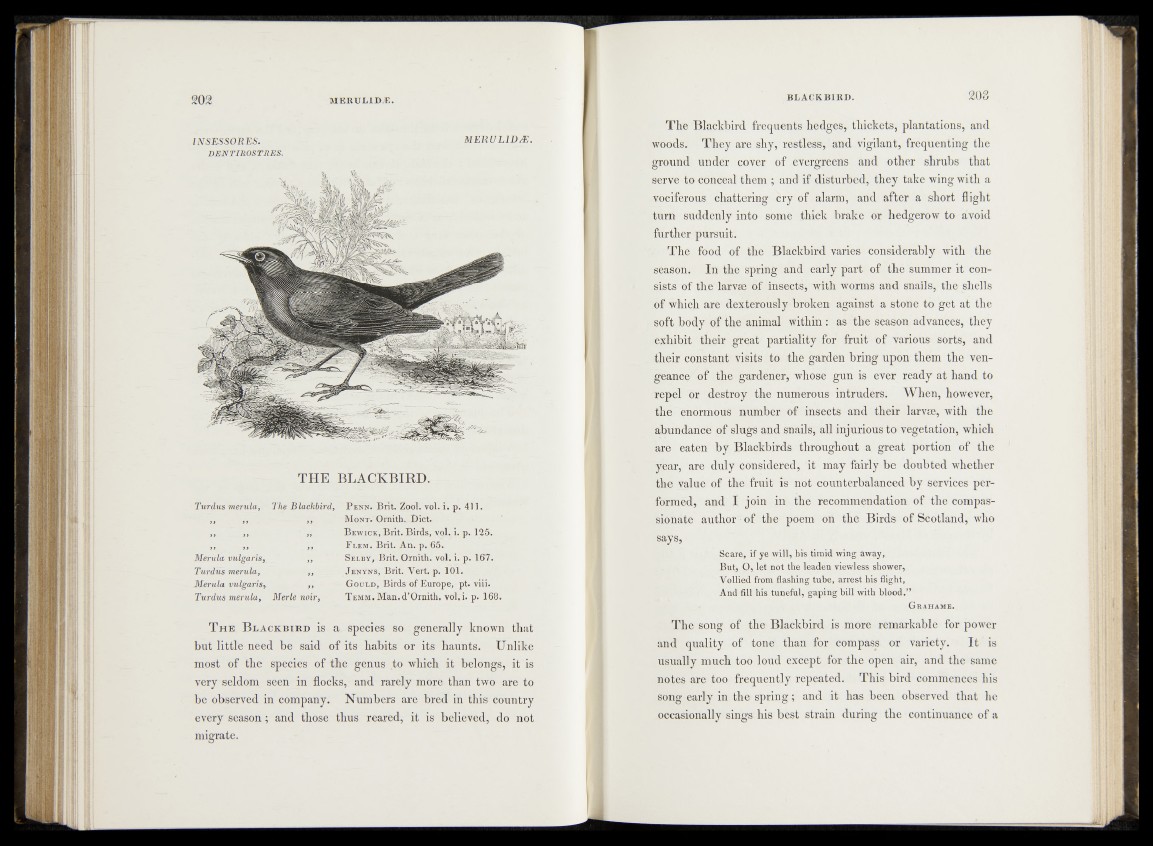
INSESSORES.
DENTIROSTRES.
MEUUL1DJE.
TH E BLACKBIRD.
Turdus merula, The Blackbird,
Merula vulgaris, ,,
Turdus merula, ,,
Merula vulgaris, ,,
Turdus merula, Merle noir,
P enn. Brit. Zool. vol. i. p. 411.
Mont. Ornith. Diet.
B ewick, Brit. Birds, vol. i. p. 125.
F lem. Brit. An. p. 65.
S elby, Brit. Ornith. vol. i. p. 167.
J enyns, Brit. Vert. p. 101.
G ould, Birds of Europe, pt. viii.
T emm. Man.d’Ornith. vol.i. p. 168.
T h e B l a c k b i r d is a species so generally known that
but little need be said of its habits or its haunts. Unlike
most of the species of the genus to which it belongs, it is
very seldom seen in flocks, and rarely more than two are to
be observed in company. Numbers are bred in this country
every season; and those thus reared, it is believed, do not
migrate.
The Blackbird frequents hedges, thickets, plantations, and
woods. They are shy, restless, and vigilant, frequenting the
ground under cover of evergreens and other shrubs that
serve to conceal them ; and if disturbed, they take wing with a
vociferous chattering cry of alarm, and after a short flight
turn suddenly into some thick brake or hedgerow to avoid
further pursuit.
The food of the Blackbird varies considerably with the
season. In the spring and early part of the summer it consists
of the larvse of insects, with worms and snails, the shells
of which are dexterously broken against a stone to get at the
soft body of the animal within : as the season advances, they
exhibit their great partiality for fruit of various sorts, and
their constant visits to the garden bring upon them the vengeance
of the gardener, whose gun is ever ready at hand to
repel or destroy the numerous intruders. When, however,
the enormous number of insects and their larvse, with the
abundance of slugs and snails, all injurious to vegetation, which
are eaten by Blackbirds throughout a great portion of the
year, are duly considered, it may fairly be doubted whether
the value of the fruit is not counterbalanced by services performed,
and I join in the recommendation of the compassionate
author of the poem on the Birds of Scotland, who
says,
Scare, if ye will, his timid wing away,
But, O, let not the leaden viewless shower,
Vollied from flashing tube, arrest his flight,
And fill his tuneful, gaping bill with blood.”
G rahame.
The song of the Blackbird is more remarkable for power
and quality of tone than for compass or variety. I t is
usually much too loud except for the open air, and the same
notes are too frequently repeated. This bird commences his
song early in the spring; and it has been observed that he
occasionally sings his best strain during the continuance of a